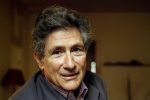 Edward Said is primarily known for this views on Palestine and Israel and for this book “Orientalism” which defined and inspired the post-colonial studies, as discussed before on this blog. He, however, also left a dozens if not hundreds of essays and interviews — the goldmine for anyone interested in the issues of politics, literature, the art of living and struggles of (intellectual) exile and multi-culturalism. Said’s essay “On Defiance and Taking Positions” is very interesting as it tells us what it means, to him, to be a good academic and a public intellectual. Here a few extracts and quotes which drive his point home so powerfully.
Edward Said is primarily known for this views on Palestine and Israel and for this book “Orientalism” which defined and inspired the post-colonial studies, as discussed before on this blog. He, however, also left a dozens if not hundreds of essays and interviews — the goldmine for anyone interested in the issues of politics, literature, the art of living and struggles of (intellectual) exile and multi-culturalism. Said’s essay “On Defiance and Taking Positions” is very interesting as it tells us what it means, to him, to be a good academic and a public intellectual. Here a few extracts and quotes which drive his point home so powerfully.
On valuing academic freedom, however limited, in the U.S. and Europe. The rest of the world is not yet there for that, he thought…
I shall begin by saying, first of all, that compared, say, to most African, Asian and Middle Eastern universities, the American university constitutes a relatively utopian space, where we can actually talk about the boundaries of the academy. In other universities in other parts of the world, of course, the academy is part of the political system, and academic appointments are necessarily, very often the case, outright political appointments.
About the commitment to students and to profession:
Nevertheless, the first point I want to make is that it seems to me that the role of the member of the academy, the teacher, the scholar, the professor, is principally to his or her own field. That is to say, I think that there’s no getting away from the fact that, speaking now as a teacher, my principal constituency is made up by my students; and therefore, there is no substitute, no amount of good work on the outside, no amount of involvement, that is a substitute for commitment not to only one’s students, but also the rigors of the discipline in which one finds oneself.
On teaching critical awareness, the ability to be skeptical, to ask questions, not to take anything for granted:
…but there is I think a terribly important thing that one can teach at the same time that one teaches a field or a subject or a discipline — and that is some sense of critical awareness, some sense of skepticism, that you don’t take what’s given to you, even to your own students. You try not to give them the material with the sense that it’s unquestioned and somehow authoritative, but rather to cultivate at the same time, what seems to be paradoxically at odds with it, namely a kind of healthy skepticism for what authorities say.
On the role of a public intellectual in a contemporary world
I think the intellectual plays a particular role, and this role is essentially — it is perhaps easiest to define it in terms of negatives — is that the intellectual, as opposed to the professional, is someone who is, by the very virtue of this vocation, an opponent of consensus and orthodoxy, particularly at a moment in our society when the authorities of consensus and orthodoxy are so powerful; and the role of the individual, the voice of the individual, the small voice if you like, of the individual tends to be not heard. So the role of the intellectual is not to consolidate authority, but to understand, interpret, and question it; this is another version of what Bob Pollack was talking about in the notion, of course, of speaking the truth to power, a point I make in my book, Representations of the Intellectual.
On being critical and sometimes even marginalised…
…I think that the most important thing for the intellectual in the public sphere, beyond the bounds of the academy, is some sort of sense of independence, that you’re speaking really with your own voice and from your own sense of conviction, and that you try your best somehow not to collaborate with the centralizing powers of our society. I’m speaking really about this particular moment, where it’s very, very easy, given debates on social policy or foreign policy that are necessarily shaped, to a certain degree, by the government. It strikes me as difficult but necessary to try to be somewhat marginal, rather than to be right in the middle of some office-making policy.
For the whole essay and other essays published in a bundle in 2001, read here.